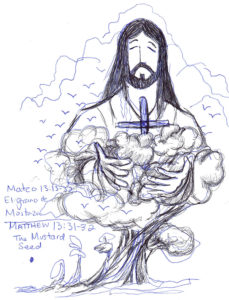Kacie came to Casa Juan Diego as a Catholic Worker after graduating from the University of Notre Dame to spend the better part of a year here before going to medical school.
It is 3 o’clock in the morning. While the tight-knit team of Catholic Workers would normally be fast asleep – exhausted from the previous day’s works of mercy and recharging for the unpredictable yet exciting affairs of the day to come – instead we are wide awake. During these uncharted hours before dawn, we are neither bidding farewell to someone who must fly to meet their loved one nor rushing to Ben Taub Hospital to recollect our discharged guest. Both of these responsibilities would not be unusual. Rather, on this intentional Lenten outing, we are kneeling in a chapel in silent adoration with our eyes transfixed upon the beauty and mystery of the Blessed Sacrament exhibited before us. As Catholics, we believe that Jesus is truly present in the Eucharist. It is a wonder of faith that simple forms of nourishment, bread and wine, become the essential and life-giving body and blood of Christ in a transformation like no other. My gaze remains steady as the monstrance dazzles and hypnotizes, but my mind wanders to reflect upon the similarly powerful transformations to which I have borne witness at Casa Juan Diego.
Crossing the threshold of Casa’s door during my initial visit last June, the eclectic happenings native to Casa Juan Diego overwhelmed my senses: Pallets of produce and canned goods lining the hallways, volunteers intently beelining in every direction, an extensive line of sick and injured persons patiently waiting for their monthly assistance, and a steady stream of hungry people coming for bags of food. Outside, there are too few parking spaces occupied by twice as many cars. Perhaps the most salient sight is weary new immigrants approaching in search of safe shelter during their first days in the country, often bearing few physical belongings but a cumbersome emotional baggage. I later came to appreciate how the busyness here is a signal of good work happening; it is a beautiful chaos. Worth mentioning is that Louise, who is animated by her own love for “Jesus in the distressing disguise of the poor” and carrying on the zealous spirit of Dorothy Day and her late husband Mark, remains amazingly poised amidst the frenzy.
When I later arrived to start my journey as a Catholic Worker and acclimate to this foreign environment, each moving part of Casa began to disclose its identity. The pallets of food became a humble source of sustenance for hundreds of hungry families. The small fleet of vehicles in the parking lot became the means for transporting children to receive vaccines, driving pregnant guests to their prenatal appointments, and collecting dozens of prescriptions to help our clinic patients live with dignity by more comfortably managing their illnesses. I recognized the influx of donated sandwiches to be nourishment for the male guests who leave the house each day in search of work, the women who wait in-line all day at the Immigration Office, and the individuals experiencing homelessness who are regularly welcomed at the door. The bags of masa evolved from a type of flour foreign to me into a staple ingredient of tortillas or arepas, a tasty dish that our beloved Venezuelan guests cook with passion and pride. The long line outside the door went from being a purely daunting sight toward the opportunity to personally greet each visitor, hear their story, and respond with simple but purposeful actions. I will forever associate the meaning behind each feature of Casa with the people at the door, in the clinic, and in the shelter who so touched my heart while carrying out this work.
I am in continual awe of how God makes Himself fully present and infiltrates every action at Casa Juan Diego, engendering a breeding ground for faith, hope, and charity. How lucky we are to have vitality and strength in our hands, minds, and hearts so that we may serve as conduits of His healing love. How blessed we are to operate within a special community where human dignity and value are prioritized over the possession of legal status – a formality that should truly have no bearing on how someone is personally treated. We often reference Matthew 25:31-40 to characterize the work that we do, a verse in which Christ instructs His disciples to show love and mercy to others, particularly those who are vulnerable. It is through His guidance on how to exercise compassion that our simple efforts of hospitality are beautified and transformed into acts that genuinely heal hearts and restore life, in an entirely reciprocal fashion. It is akin to, and a reminder of, the transformation by which Christ freely and lovingly offers his flesh in the form of bread and wine so that we may draw closer to the source of all life and love, God, and enrich our faithful hope in the destruction of evil, injustice, and suffering.
I have been fortunate to learn lessons from the women living here, especially in the realm of hospitality. “Mary,” one of our longer-term guests, inspired me while acting as a mother figure for our newer, unsettled guests. I recall receiving someone who was particularly troubled and on the verge of tears. Sensing this pain, Mary took the new guest under her wing and directed her to get some food, coffee, and a chair to rest. This was only one occasion of many in which Mary helped love a woman into a better existence. A month prior, another guest had slipped and fallen down the stairs, whacking her poor elbow on the tumble downward. The women flocked to her side and began tending her, slathering copious amounts of Vicks VapoRub on the injured arm. When it became apparent that our fallen guest needed medical attention from someone other than Dr. Vicks, Mary immediately volunteered to accompany the injured guest and stay with her in the Emergency Room – an ordeal that could last all night. I am humbled, amused, and grateful that in our house of hospitality, I have witnessed the patient, kind, and nurturing behavior of our women.
Living in devoted service and community with some of the most vulnerable, incriminated against, and outcast persons has been the privilege and gift of a lifetime. Among many discoveries within this dynamic place, I have affirmed that no linguistic, cultural, or socioeconomic barriers can hinder the formation of cherished relationships. With this awareness coincides my intensified eagerness to meet people where they are, which is often within a complicated and distressing situation, and to love them all the same. A necessary clarification: this is no easy love. Truthfully, every day is a test of patience and strength. Our daily and nightly work is an exercise best summarized by novelist Dostoevsky’s words, “Love in action is a harsh and dreadful thing compared to love in dreams.” Several nights ago, I heard a knock on my door from a guest who had been worried sick about her husband stuck in a detention center. I uttered a quick prayer of ‘Lord, give me strength’ as I often do in these trying moments, and then proceeded to open the door. She thrust over her phone and instructed me to talk to the taxi driver who was inquiring about what to do with the phone-less, fund-less, Portuguese-speaking man who he had just picked up from a detention center in California. The four of us went back and forth for quite some time, nearly waking up the entire household as we frantically created a plan to aid this new immigrant to safety. The next morning, further adept efforts from my teammates helped secure the delivery of our guest’s husband to Casa Juan Diego. While situations are seldom easy when we aim to meet others where they are, I always remind myself that God too will meet us where we are – in our feelings of impatience, inadequacy, and insignificance – and help us to persevere. It is the difficult love in action, such as the perplexing nighttime conversations that span innumerable language and social barriers, that draw us closer to one another. Close enough to experience the joy and suffering of our fellow neighbors, and close enough to see the face of Christ.
When I arrived at Casa seven months ago from this writing, I could not have imagined discussing life stories, sharing laughter, and building genuine friendship with the immigrants and refugees who visit Casa. I would never have expected to receive messages from former guests who continue to check in and send invitations to their apartments for social visits – occurrences that only further demonstrate to me that the sense of family established under Casa’s roof is tender, strong, and true. By God’s grace, we are empowered daily to lean on our common humanity and draw closer to each other in nourishing, life-giving relationships. While there is a complex number of moving parts to this, especially in a place where the personal situations are so varied and challenging, the work is truly as simple as doing what we have been called to do – to love one another, with the bestowed knowledge that whatever we do to the least of our brothers and sisters, we are doing unto Christ.
It is during this Lenten season that I reflect upon the transformations that are occurring within me and around me at Casa Juan Diego. I contemplate the transubstantiation, a mysterious and divine gift involving the conversion of an ordinary substance into the extraordinary. This theme has seemingly woven itself into the humble works of Casa Juan Diego, as God too moves throughout this space to sanctify the mundane. I meditate on the Resurrection soon to come, which signifies the conquering of death and thereby extends hope to all those here who seek the promise of a new life. And lastly, I consider the personal transformations that we may experience as God beckons us to direct our lives with greater compassion towards others. In doing so, we are enabled to see each person in front of us as a unique opportunity to glimpse into His infinite love. Amidst the noise generated by the hustle and bustle of our modernizing world, I am now discovering that this calling is sometimes only perceptible upon intentionally silencing my heart and listening, perhaps even at 3 o’clock in the morning, in His most beautiful and sacred presence.
Houston Catholic Worker, April-June, 2023., Vol. XLIII, No, 2.



